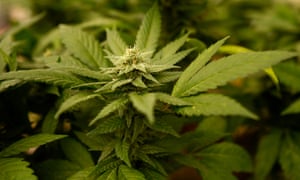Brain scans show how cannabis extract may help people with psychosis
Cannabidiol reduces the brain activity linked to hallucinations, delusions and other forms of psychosis, research has found

Brain scans have revealed for the first time how a substance found in cannabis plants may help people with psychotic disorders by dampening down abnormal brain activity that arises in the patients.
A single dose of cannabidiol, an non-intoxicating extract of the plant, reduced unusual patterns of neural behaviour linked to hallucinations, delusions, and other symptoms of psychosis, researchers found.
The impact of the substance has raised hopes that medical preparations of pure cannabidiol, or new drugs based on the compound, may be turned into effective treatments for young people who develop psychosis but do not respond to existing therapies.
The most common treatments for psychosis today work on a brain chemical called dopamine, but no new drugs have been developed for the condition since they were discovered in the 1950s. “These results will clearly pave the way for developing a novel class of antipsychotic treatments,” said Sagnik Bhattacharyya, who led the research at King’s College London
Cannabis plants produce more than 100 active compounds known as cannabinoids. The most potent, and the substance responsible for the cannabis “high”, is THC or tetrahydrocannabinol. In the past two decades, cannabis with high levels of THC – about 15% – has come to dominate the market in the UK and elsewhere.
While high strength cannabis is suspected of raising the risk of mental health problems in some frequent cannabis users, cannabidiol or CBD appears to have opposite, antipsychotic properties. In illicit cannabis, there is too little CBD to have much beneficial effect, but researchers have long wondered whether doses of pure CBD may help to protect against psychosis.
“We knew from previous studies that CBD had antipsychotic effects, but we didn’t know how it worked,” said Bhattacharyya.
To find out, the researchers recruited 33 people who had all sought help for mild or occasional psychotic symptoms, such as hearing voices or having paranoid delusions. A single dose of cannabidiol was given to 16 of them, while the remaining 17 received an identical-looking placebo.
The scientists then watched how the volunteers’ brains behaved as they performed simple tasks in a magnetic resonance imaging machine. While in the brain scanner, the participants were asked to say whether pairs of words, such as ‘baby’ and ‘cries’ were related or not, and later, to recall the word that completed a pair when prompted by the scientists.
When the researchers compared scans from the different patient groups, and with scans from age and sex-matched healthy people, they found that the patients with psychotic symptoms had abnormal patterns of activity in three distinct brain regions, all of which are involved in psychosis. But in patients who had a single dose of CBD, the unusual brain activity appeared to be dampened down, making their scans more similar to those of health individuals. Details of the work are published in JAMA Psychiatry.
“This was just a single dose of CBD and that is not going to treat or cure psychosis,” said Bhattacharyya. “But this shows us that CBD at least has an effect on abnormal brain activity that is consistent with it being an antipsychotic.”
The King’s College researchers are now launching the first large scale trial to investigate whether pure, medical grade CBD is an effective treatment for young people who are at high risk of developing psychosis. The trial, which is expected to start recruiting early next year, is backed by the Medical Research Council and the National Institute for Health Research.
“If the trial shows it has efficacy, then the next step will be to get through the regulatory hurdles os using CBD in the clinic to treat patients,” said Bhattacharyya. “One shouldn’t get the impression that it’s OK to start prescribing CBD tomorrow.”






